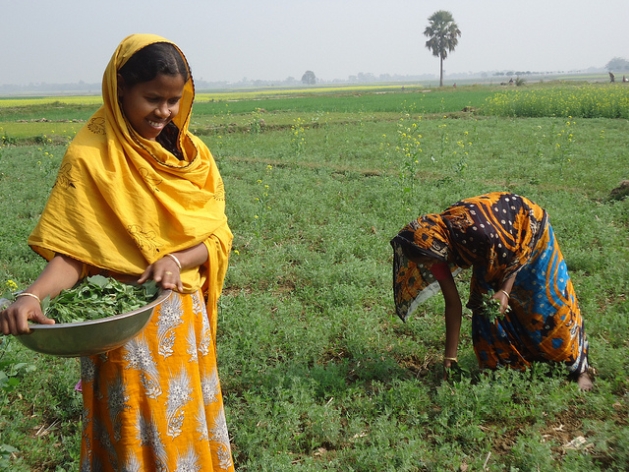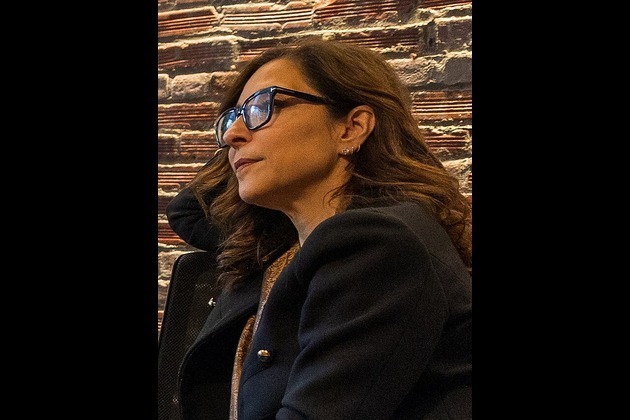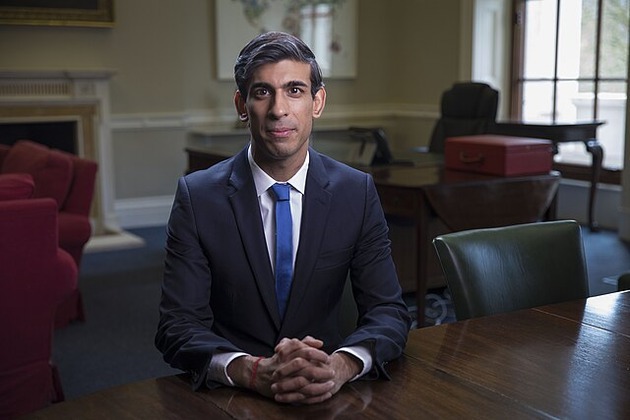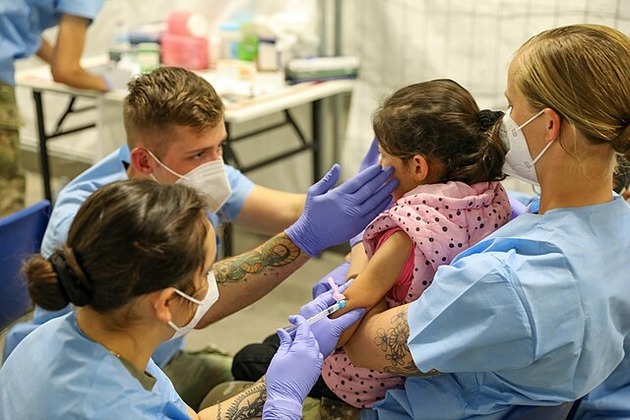Farmers Will (Again) Feed the World
iCrowd Newswire
24 Nov 2020, 01:54 GMT+10

Danielle Nierenberg is President and Founder Food Tank: Highlighting stories of hope and success in the food system

Women farmers clearing farmland in Northern Bangladesh. Credit: Naimul Haq/IPS
NEW YORK, Nov 23 2020 (IPS) - Wealthier countries struggling to contain the widening COVID-19 pandemic amid protests over lockdowns and restrictions risk ignoring an even greater danger out there - a looming global food emergency.
Even before the virus surfaced nearly a year ago, an estimated 690 million people around the world were undernourished, 144 million or 21 per cent of children under five-years-old were stunted, and about 57 per cent of people in sub-Saharan Africa and South Asia could not afford a healthy diet.
The ranks of the chronically food insecure are rising dramatically in 2020 as the pandemic adds to the miseries of communities already labouring under conflict, the climate crisis, economic slowdowns and, in east Africa, desert locusts. Every percentage drop in global GDP means 700,000 more stunted children, according to UN estimates.
All this means the world is dangerously off track in its efforts to meet the UN Sustainable Development Goals by 2030, with food systems underpinning all 17 of those targets.
Yet we do produce enough food for the world's 7.8 billion people. It's our food systems that are broken. Hunger is rising even as the world wastes and loses more than one billion tonnes of food every year.
About one third of all food produced for human consumption goes to waste, according to the Food and Agriculture Organization of the United Nations, with consumers in rich countries wasting almost as much food as the entire net production of sub-Saharan Africa.

Danielle Nierenberg
With agriculture and the current food system responsible for around 21 to 37 per cent of total greenhouse gas emissions, our food choices matter not just for health and social justice, but also for their impact on the climate and bio-diversity. The true impact of food production and consumption needs a far better understanding and cost accounting.
Resetting the Food System from Farm to Fork, a virtual event hosted on December 1 by the Barilla Center for Food & Nutrition in partnership with Food Tank, will help set the stage for the UN 2021 Food Systems Summit.
Experts will present concrete, practical solutions to re-align food systems with human needs and planetary boundaries to become more resilient, inclusive and sustainable in the aftermath of the pandemic and beyond.
The conference will highlight the important role of smallholders and women who make up a sizeable proportion of the agricultural workforce - 43 percent on average in developing countries, according to FAO, the UN food agency.
Women are tending to bear the brunt of hunger, but as farmers, innovators and decision-makers, they need to be involved for real change to happen. They are the backbone of the rural economy, especially in poorer countries, but receive only a fraction of the land, credit, inputs such as improved seeds and fertilizers, agricultural training and information compared to men.
Africa is a huge net importer of food but 75 percent of crops grown in sub-Saharan Africa are produced by smallholder farms, with family farms estimated to number over 100 million. Women do the bulk of weeding work while three-quarters of children aged 5 to 14 are forced to leave school and do farm labour at peak times.
Sixty percent of Africa's total population are below 25 year, yet countries are struggling to keep young people involved in agriculture and agribusiness.
Our challenge is to transform food systems so that people are no longer food insecure and can afford a healthy diet while at the same time ensuring environmental sustainability. There is no one-size-fits-all solution for countries, and policy-makers lack reliable data on the whole spectrum of food production.
The Barilla Center for Food & Nutrition has a 10-point action plan for fixing the global food system, and improving standards, terminology and measurement are among those priorities. Its Food Sustainability Index, developed with the Economist Intelligence Unit, uses the three pillars of nutrition, sustainable agriculture, and food loss and waste to provide a tool that can shed light on the progress countries are making on the path to a more sustainable food system.
The COVID-19 pandemic may add between 83 and 132 million people to the total number of undernourished in the world this year alone, depending on the scale of the economic slowdown, according to preliminary assessments.
Disruptions have raised food costs, made it more difficult for farmers to access seeds, animal feed and fertilisers, and resulted in higher post-harvest losses as food rots uncollected on farms.
In the words of UN Special Envoy Agnes Kalibata: "Countries face an agonizing trade-off between saving lives or livelihoods or, in a worst-case scenario, saving people from COVID-19 to have them die from hunger."
The problems facing our food systems for years have been highlighted by this crisis, as have the numerous frailties of global supply chains and the state of national health systems.
Let us seize this opportunity presented by the pandemic and shape a resilient food system that is sustainable, fairer, and healthier for all people and the planet.
Podcast: "Food Talk with Dani Nierenberg" I chat with the most important folks in the food system about the most important food news.
Tags:, Content Marketing, Financial Content, Extended Distribution, iCN Internal Distribution, English
 Share
Share
 Tweet
Tweet
 Share
Share
 Flip
Flip
 Email
Email
Watch latest videos
Subscribe and Follow
Get a daily dose of Philadelphia Herald news through our daily email, its complimentary and keeps you fully up to date with world and business news as well.
News RELEASES
Publish news of your business, community or sports group, personnel appointments, major event and more by submitting a news release to Philadelphia Herald.
More InformationBusiness
SectionAI saves $500 million for Microsoft as layoffs reshape strategy
REDMOND, Washington: Artificial intelligence is transforming Microsoft's bottom line. The company saved over US$500 million last year...
FTC’s rule to ease subscription cancellations struck down by court
WASHINGTON, D.C.: A federal rule designed to make it easier for Americans to cancel subscriptions has been blocked by a U.S. appeals...
Musk’s X loses CEO Linda Yaccarino amid AI backlash, ad woes
BASTROP, Texas: In a surprising turn at Elon Musk's X platform, CEO Linda Yaccarino announced she is stepping down, just months after...
Ex-UK PM Sunak takes advisory role at Goldman Sachs
NEW YORK CITY, New York: Former British prime minister Rishi Sunak will return to Goldman Sachs in an advisory role, the Wall Street...
Gold ETF inflows hit 5-year high as tariffs drive safe-haven bets
LONDON, U.K.: Physically backed gold exchange-traded funds recorded their most significant semi-annual inflow since the first half...
PwC: Copper shortages may disrupt 32 percent of chip output by 2035
AMSTERDAM, Netherlands: Some 32 percent of global semiconductor production could face climate change-related copper supply disruptions...
International
SectionCDC: US records 1,288 measles cases, most since 1992 outbreak
ATLANTA, Georgia: The United States is facing its worst measles outbreak in more than three decades, with 1,288 confirmed cases so...
Gaza War sucking life out of an Israeli generation
In the past month alone, 23 Israeli soldiers have been killed in Gaza—three more than the number of remaining living hostages held...
Faulty IT system at heart of UK Post Office scandal, says report
LONDON, U.K.: At least 13 people are believed to have taken their own lives as a result of the U.K.'s Post Office scandal, in which...
Travelers can now keep shoes on at TSA checkpoints
WASHINGTON, D.C.: Travelers at U.S. airports will no longer need to remove their shoes during security screenings, Department of Homeland...
Rubio impersonator used AI to reach officials via Signal: cable
WASHINGTON, D.C.: An elaborate impersonation scheme involving artificial intelligence targeted senior U.S. and foreign officials in...
Warsaw responds to migration pressure with new border controls
SLUBICE, Poland: Poland reinstated border controls with Germany and Lithuania on July 7, following Germany's earlier reintroduction...













